It was make or break for Blur when they recorded the Parklife album. With their second record, Modern Life Is Rubbish, the group had found their voice, yet mainstream success remained frustratingly out of reach. As their record label attempted to hold tight onto the reins for its follow-up, Damon Albarn, Graham Coxon, Alex James and Dave Rowntree broke loose with a career-making work that still stands among the best Blur albums. This track-by-track guide to all 16 Parklife songs explains exactly why that’s the case.
Listen to ‘Parklife’ here.
‘Parklife’: A Track-By-Track Guide To Every Song On Blur’s Breakthrough Album
Girls & Boys
One of the first songs recorded for Parklife, Girls & Boys set the jubilant mood for the remainder of the sessions. A simple disco beat gave Alex James plenty of room to swing a Duran Duran-inspired bassline, while Graham Coxon did his best to drag the song from the dancefloor and take it out back for a roughing-up with some Wire-like guitar. With Damon Albarn singing about hedonistic Club 18-30 holidays in a way that would appeal to listeners who loved or loathed them, the song made good on producer Stephen Street’s prediction that it would give Blur their first UK Top 5 hit.




